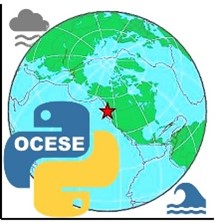The Opensource Computing for Earth Science Education is a three-year, large TLEF-funded project that will incorporate open-source computational tools in EOAS courses and transform teaching practices to support hands-on interdisciplinary learning in data-driven scientific exploration. Funding runs from May 2020 – April 2023.
Year one priorities include infrastructure and tools development because these are prerequisites to implementing educational initiatives in courses, and professional development activities for instructors. The following outline is dated February 2021.
Project Goals
-
 Develop computational, numerical and Earth science skills of EOAS graduates by using Jupyter notebooks, Python programming, interactive dashboards, and active pedagogies.
Develop computational, numerical and Earth science skills of EOAS graduates by using Jupyter notebooks, Python programming, interactive dashboards, and active pedagogies. - Engage new and existing faculty in the development and use of cutting-edge interactive data-driven Earth Science curricula.
- Support faculty with professional development that enables them to incorporate tools and techniques starting with efficient, small-scale options and adding learning and instructional capabilities as time and energy permit.
- Contribute to the Faculty of Science’s strategic initiative to create a minor in Data Science through the development of upper-level applied data science courses, and creation of assignments, activities, and assessments for DSCI 100.
- For details and project documentation, please see our OCESE project website.
Anticipated impacts
- Improved efficiency, agility, and relevance of data science & computing pedagogy in EOAS.
- Increased versatility and relevance of numerical and computational skills of an increasing number of quantitatively oriented students taking degrees with EOAS.
- Sustainable hardware, software and workflows that enable consistent learning & computing experiences of instructors and students regardless of what personal computing resources they use.
- Training new and existing faculty and researchers to use new, open source computational tools.
People and partnerships
- Project lead: Tara Ivanochko, Phil Austin.
- Primary project support: Francis Jones
- EOAS faculty: Co-applicants on the project proposal are Susan Allen, Phil Austin, Roger Beckie, Michael Bostock, Eldad Haber, Mark Jellinek, Catherine Johnson, Mark Johnson, Valentina Radic, Associate Professor, Stephanie Waterman.
- Student involvement: Student contributors (work and volunteer) in programming and other roles are listed on the project website’s personnel page.
-
Related projects
- QuEST, the Quantitative Earth Sciences Transformation project.
- Data Science Minor, a program coordinated out of the Stats department.
- DSCI 100, a new first year course introducing statistics, data science and programming.
Status and further details
- Funding & Departmental commitment: Large TLEF funding for three years support plus in-kind contributions from the Department.
- Timeline: May 2020 through April 2023.
- Website (likely to change), GitHub
